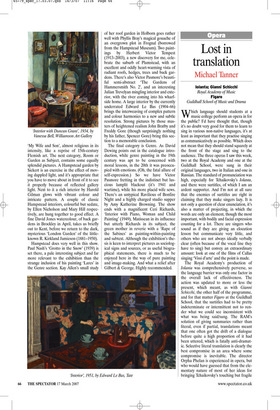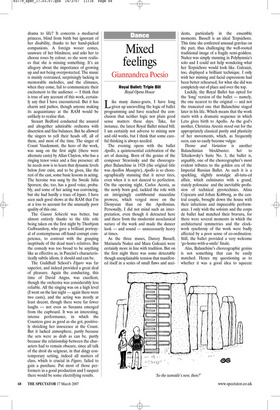Lost in translation
Michael Tanner
Iolanta; Gianni Schicchi Royal Academy of Music Figaro Guildhall School of Music and Drama Which language should students at a music college perform an opera in for the public? I’d have thought that, though it’s no doubt very good for them to learn to sing in various non-native languages, it’s at least as important that they practise singing as communicatively as possible. Which does not mean that they should stand squarely at the front of the stage and sing to the audience. The three operas I saw this week, two at the Royal Academy and one at the Guildhall School, were sung in their original languages, two in Italian and one in Russian. The standard of pronunciation was high, especially for Tchaikovsky’s Iolanta, and there were surtitles, of which I am an ardent supporter. And I’m not at all sure that the enemies of surtitles are right in claiming that they make singers lazy. It is not only a question of clear enunciation, it’s also a matter of projecting, in which the words are only an element, though the most important, with bodily and facial expression counting for a lot. There are singers who sound as if they are giving an elocution lesson but communicate very little, and others who are not always ideally verbally clear (often because of the vocal line they have to sing) but convey an extraordinary amount: look at one of the films of Callas singing ‘Vissi d’arte’ and the point is made.
The Royal Academy’s production of Iolanta was comprehensively perverse, so the language barrier was only one factor in the overall lack of effectiveness. The action was updated to more or less the present, which meant, as with Gianni Schicchi, the other half of the programme, and for that matter Figaro at the Guildhall School, that the surtitles had to be pretty indeterminate or intermittent not to render what we could see inconsistent with what was being said/sung. The RAM’s solution of giving summaries rather than literal, even if partial, translations meant that one often got the drift of a dialogue before quite a high proportion of it had been uttered, which is fatally anti-dramatic. Selective literal translation is clearly the best compromise in an area where some compromise is inevitable. The director Orpha Phelan is experienced in opera, but who would have guessed that from the elementary nature of most of her ideas for bringing Tchaikovsky’s touching but fragile drama to life? It concerns a mediaeval princess, blind from birth but ignorant of her disability, thanks to her hand-picked companions. A foreign wooer comes, unaware of her blindness, and asks her to choose roses by colour, so she soon realises that she is missing something. It’s an allegory about the importance of growing up and not being overprotected. The music is mainly restrained, surprisingly lacking in memorable melodies, and the climaxes, when they come, fail to communicate their excitement to the audience — I think that is true of any account of this work, certainly any that I have encountered. But it has charm and pathos, though anyone making its acquaintance at the RAM would be unlikely to realise that.
Steuart Bedford conducted the assured and altogether admirable orchestra with discretion and fine balances. But he allowed the singers to yell their heads off, all of them, and most of the time. The singer of Count Vaudemont, the hero of the work, was sung on the first night (there were alternate casts) by Allan Clayton, who has a ringing tenor voice and a fine presence: all he needs now is to learn that dynamic levels below forte exist, and to be given, like the rest of the cast, some basic lessons in acting. The heroine was sung by the Swede Julia Sporsen; she, too, has a good voice, probably, and some of her acting was convincing, but she had hardly a trace of legato. I have seen such good shows at the RAM that I’m at a loss to account for the unusually poor quality of this one.
The Gianni Schicchi was better, but almost entirely thanks to the title role being taken on the first night by Thorbjom Gulbrandsoy, who gave a brilliant portrayal of contemptuous off-hand corrupt competence, to contrast with the grasping ineptitude of the dead man’s relatives. But the comedy was too broad to be anything like as effective as, in Puccini’s characteristically subtle idiom, it should and can be.
The Guildhall School’s Figaro was far superior, and indeed provided a great deal of pleasure. Again the conducting, this time of David Angus, was excellent, though the orchestra was considerably less reliable. All the singing was on a high level (I went on the last night — again there were two casts), and the acting was mostly at least decent, though there were far fewer laughs — not even as Susanna emerged from the cupboard. It was an interesting, intense performance, in which the Countess gave as good as she got, positively shrieking her innocence at the Count. But it lacked atmosphere, partly because the sets were as drab as can be, partly because the relationship between the characters had to remain obscure, since all talk of the droit du seigneur, in that dingy contemporary setting, indeed all matters of class, which is crucial in Figaro, failed to gain a purchase. Put most of those performers in a good production and I suspect there would be some electrifying results.



































































































 Previous page
Previous page